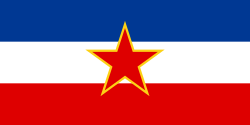| Yugoslavia at the 1984 Summer Olympics | |
|---|---|
 | |
| IOC code | YUG |
| NOC | Yugoslav Olympic Committee |
| in Los Angeles | |
| Competitors | 139 (105 men, 34 women) in 16 sports |
| Flag bearer | Dražen Dalipagić |
| Medals Ranked 9th |
|
| Summer Olympics appearances (overview) | |
| Other related appearances | |
Yugoslavia competed at the 1984 Summer Olympics in Los Angeles, United States which took place from 29 July to 12 August 1984. Yugoslav athletes had competed in every Summer Olympic Games since their official debut in 1920. The Yugoslav Olympic Committee (JOK) sent a delegation of 139 athletes, 105 men and 34 women, competing in 16 sports, down from 164 competitors in 1980. [1] Due to the Soviet-led boycott, Yugoslavia was one of only three Communist countries to take part at the Games, along with China and Romania.
Contents
- Medalists
- Competitors
- Athletics
- Basketball
- Men's tournament
- Women's tournament
- Boxing
- Canoeing
- Cycling
- Equestrianism
- Football
- Men's tournament 2
- Gymnastics
- Handball
- Men's tournament 3
- Women's tournament 2
- Judo
- Rowing
- Sailing
- Shooting
- Swimming
- Water polo
- Men's tournament 4
- Wrestling
- References
- External links
Yugoslavia left Los Angeles with a total of 18 Olympic medals (7 gold, 4 silver, and 7 bronze), finishing ninth in the overall medal standings, the best total in the history of Yugoslavia's participation in the Olympics. Five of these medals were won in team sports and included gold in both men's and women's handball tournaments, gold in the water polo tournament and bronze medals in men's football and basketball. The most successful sport was wrestling, winning the nation five medals, while the canoeing duo of Matija Ljubek and Mirko Nišović were the only Yugoslav athletes who won more than a single Olympic medal. For the first time in its history, Yugoslavia sent athletes to compete in rhythmic gymnastics, a new event introduced into the Olympic programme, with 14-year-old gymnast Danijela Simić the youngest participant in the entire Yugoslav delegation.
Among the nation's medalists were canoeist Matija Ljubek, who took his third and fourth career Olympic medals, wrestler Shaban Sejdiu, who won his second career Olympic bronze medal, another wrestler Shaban Tërstena became the youngest Olympic Champion ever in Wrestling after winning his gold medal with the age of 19 in the Men's freestyle 52 kg. [2] [3] Rowers Zoran Pančić and Milorad Stanulov who won a bronze medal in double sculls after winning silver in the same event in 1980. Water polo coach Ratko Rudić led the national men's team to triumph in the tournament, a feat he would repeat in 1988.